The post How To Grow Your Business appeared first on ClickFunnels.
Small business owners everywhere are discovering a marketing secret that’s hiding in plain sight: podcasting. But not the polished, big-budget NPR-style shows you might be thinking of. We’re talking about authentic, expertise-driven business podcasts that turn casual listeners into loyal customers.
Whether you’re a local accounting firm or a growing e-commerce brand, this guide will show you how to turn your expertise into a podcast that attracts real business.
But let’s tackle the main question first.
Should Your Business Start a Podcast?
Before investing time and resources into podcasting, let’s address some hard business truths most guides skip over.
Business Fundamentals
Have you achieved product-market fit? If you’re still figuring out your core offering or ideal customer, focus there first. A podcast won’t fix fundamental business challenges – it amplifies what’s already working.
Sales Cycle
Podcasting shines in businesses with longer sales cycles where trust and expertise matter. A podcast can nurture prospects over time if you’re selling high-ticket services or complex B2B solutions. But if you run a simple e-commerce store with impulse purchases, your resources might be better spent on immediate-return channels.
Un-trackable ROI
Before you invest in podcasting, here’s a truth most marketing guides won’t tell you: podcasting for business requires embracing the unmeasurable. Unlike paid ads or email campaigns where you can track every click, much of a podcast’s impact happens in ways traditional analytics can’t capture.
Consider starting a podcast if you’re comfortable playing the long game and understand that some of your best results will come through “dark social” – private messages, word-of-mouth recommendations, and informal conversations where people share your episodes. The real magic of business podcasting often happens in these invisible networks of trust and referral.
Audience, Communication, and Commitment
Podcasting works especially well if your expertise can be shared through conversation. For example, suppose you’re a financial advisor who loves breaking down complex money concepts or a fitness trainer who enjoys explaining workout techniques. In that case, your knowledge will translate naturally to the podcast format.
Here’s when you might want to skip podcasting: If you struggle to talk about your work, you can’t commit to regular episodes, or your target audience simply doesn’t listen to podcasts. Remember, a poorly maintained podcast can hurt your brand more than having no podcast.
The key question isn’t “Can I start a podcast?” (because technically, anyone can). Instead, ask yourself: “Can I consistently share valuable insights that my target customers want to hear?” If the answer is yes, and you’re willing to work to do it right, podcasting could be your next smart marketing move.
Benefits of Podcasting for Your Business
Starting a business podcast can open up exciting new ways to grow your company and connect with more customers. Think of it as having your own radio show where you can share your expertise and build relationships with listeners.
One of the biggest benefits is that podcasting helps establish you as an expert in your field. When you regularly share valuable insights and industry knowledge, people start seeing you as a trusted authority. This trust often leads them to choose your business when they need products or services you offer.
Podcasts also create a personal connection with your audience. Unlike written content, listeners get to hear your voice and personality, which makes them feel like they know you. This personal touch helps build stronger relationships with potential customers.
Marketing through podcasts is also cost-effective. Once you have basic recording equipment, creating episodes is relatively inexpensive compared to other marketing methods. Plus, your content stays available online forever, continuing to attract new listeners long after you’ve recorded it.
Another great advantage is reaching people during their daily routines. Unlike blogs or videos that need visual attention, people can listen to podcasts while driving, exercising, or doing housework. This means more opportunities for your message to reach potential customers.
Podcasting can also lead to valuable networking opportunities. When you interview guests for your show, you’re building relationships with other industry professionals who might become partners or refer customers to you.
Define Your Podcast’s Purpose
When starting a business podcast, you can’t just turn on the microphone and start talking about random business topics. You need a clear purpose that helps potential listeners quickly understand what your show is about and decide if it’s worth their time.
For example, here’s a quick purpose mentioned on Ali Abdaal’s podcast:
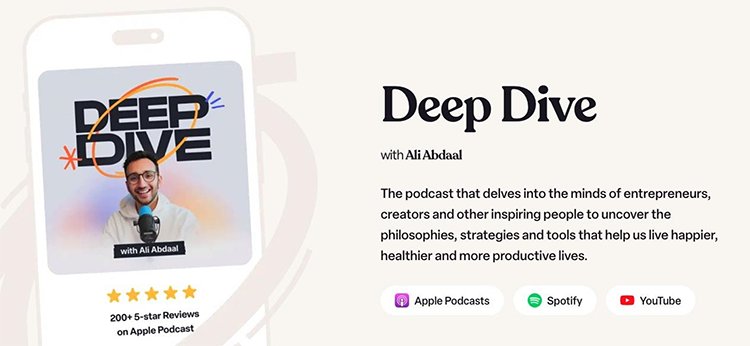
Your podcast should naturally connect to what your business does. If you’re a marketing agency teaching social media tips but your actual business focuses on website design, there’s a disconnect that might confuse your audience. Your podcast should showcase what you’re best at and ultimately help grow your business.
Before you start recording, sit down and ask yourself these important questions:
- What unique knowledge or expertise can your business share?
- What common problems do your customers face that you can address?
- How will this podcast help grow your business in the long run?
- What topics can you consistently create content about?
- What makes your perspective different from other industry podcasts?
- How does this podcast fit into your overall marketing strategy?
For example, a digital marketing agency could host a podcast sharing proven strategies for online growth. Or a local real estate company could discuss market trends and home-buying tips.
At ClickFunnels, we run a podcast focused on online marketing and sales strategies. Our podcast purpose perfectly aligns with our business – teaching entrepreneurs about funnel building, online marketing, and business growth through interviews with successful business owners.
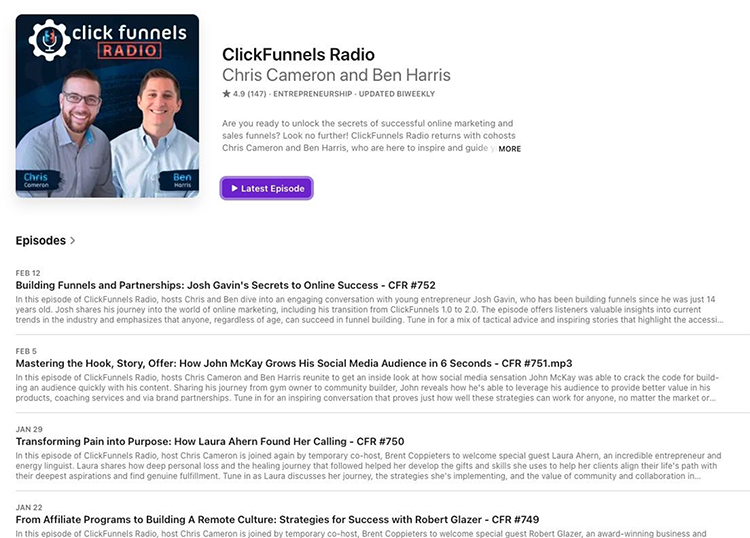
Plan Your Content Strategy
Podcast Purpose is your overall “why” – the main reason your podcast exists. For example, “helping small business owners understand and implement digital marketing.” This stays constant and guides everything you do.
But you still need the “how” – the practical plan for delivering on that purpose through specific episodes. That is your content strategy.
A solid content strategy helps you avoid the dreaded “What should I talk about this week?” panic. It ensures your podcast consistently delivers value to your listeners while supporting your business goals.
It includes:
- What exact topics you’ll cover
- How you’ll structure each episode
- Who you’ll invite as guests
- Which format to use (interviews, solo shows, case studies)
- When you’ll release episodes
When planning your first few months of content, write rough outlines for each planned episode to ensure you cover all important points.
Keep a running list of potential guests and match them with relevant topics that would benefit your audience. This advanced planning helps you maintain quality and consistency while reducing the stress of last-minute content creation.
Create Your Podcast Brand
Just like your business has a distinct identity with its name, logo, and color scheme, your podcast needs its own brand identity. While it should align with your business branding, it needs to be optimized specifically for the podcast medium.
Here’s what makes up your podcast brand:
Name of Your Podcast
It should be clear and searchable, ideally giving listeners a hint about what your podcast offers.
If you’re a well-known brand like Shopify or Ahrefs, using your business name for your podcast makes sense as people already know and trust you.
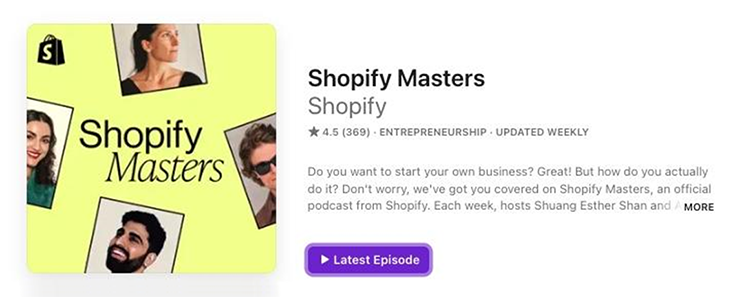
But if your business name is something like “XJ Solutions” or doesn’t clearly explain what you do, you might want to choose a more descriptive podcast name.
Choose a name that tells listeners what they’ll learn.
For example, Ramit Sethi, a personal finance author, didn’t simply name his podcast “The Ramit Sethi Show.” Instead, he chose “Money For Couples with Ramit Sethi” — a name that immediately tells potential listeners exactly who the podcast is for (couples) and what they’ll learn about (money management).

Whatever name you choose should be:
- Easy to spell and say (people need to find you in search)
- Different from other podcasts (check Apple Podcasts and Spotify)
- Related to your business and content
- Something you won’t outgrow quickly
Visual Identity
This includes:
- Cover art
- Episode thumbnails
- Any graphics you’ll use on social media
These should match your business branding but be optimized for podcast platforms. Most people will first see your cover art as a tiny thumbnail on their phone.
If you’re building a personal brand or your business relies heavily on you as the face of the company, including your photo can help build connections with potential listeners. But if you’re focusing more on the topics or representing a larger business, a well-designed graphic cover with your show’s name might work better.
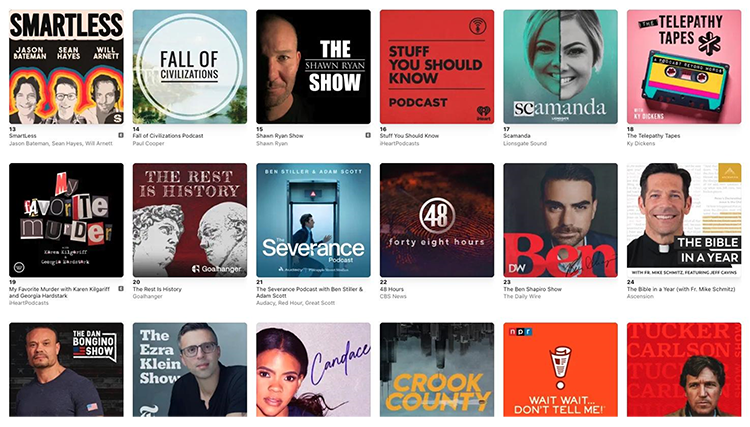
For example, as you can see in the popular podcasts above, shows like The Shawn Ryan Show and The Ben Shapiro Show use their host’s photos since they’re personality-driven shows. While podcasts like “Stuff You Should Know” and “Fall of Civilizations” focus on strong typography and graphics since they’re more topic-focused.
Voice and Personality
Your show’s voice and personality matter too. Will your podcast be formal and educational, or casual and conversational?
This affects everything from your intro music to how you speak to your audience. Write a show description that captures this tone while clearly explaining what value listeners will get.
Set Up Your Recording Space
Creating a professional-sounding podcast starts with your recording environment. While you don’t need an expensive studio, you do need a space that minimizes unwanted noise and echo. A small room with soft furnishings like curtains, carpets, and cushions can work perfectly – these items help absorb sound and reduce echo.
Essential equipment:
- A good USB microphone (like the Blue Yeti or Audio-Technica ATR2100x)
- Headphones for monitoring your audio
- Simple mic stand to maintain a consistent distance
Before recording, do a quick environment check. Close windows to reduce outside noise, turn off any noisy appliances, and turn your phone on silent. Test your recording levels and make sure you’re comfortable – you’ll want water nearby to keep your voice clear during longer recording sessions.
Once your recording space is set up properly, you can focus on what matters most — creating engaging content and naturally weaving in mentions of your products or services to your listeners, which brings us to the next section.
Mention Your Products Without Sounding Salesy
During your podcast episodes, look for organic opportunities to mention your products or services. But do it in a way that genuinely helps solve the problems being discussed.
Frame your offering as a natural solution rather than forcing it into the conversation. When discussing challenges your audience faces, briefly mention how your product or service has helped others overcome similar issues. Keep these mentions brief and valuable.
For example, Ramit Sethi demonstrates this perfectly in his podcast. During a discussion about couples struggling with food budgets, he naturally transitions into mentioning his book “Money for Couples” by saying, “So one of the things I talk about in my book…”

He doesn’t just plug the book – he immediately provides value by sharing a concrete example about creating a family money culture and no-debt policy. The mention feels organic because it flows from a real problem being discussed,
Drive Podcast Listeners to Your Website
While your podcast provides valuable content, your website or landing page is where listeners can dive deeper and ultimately convert into customers or engaged community members. So, create clear pathways from your audio content to your online presence.
It’ll help you:
- Builds your email list
- Opens opportunities for direct sales
- Add more value to genuinely interested listeners
For example, Freakonomics does this brilliantly. Their episodes lead listeners to their website with the CTA ‘Episode Webpage.’
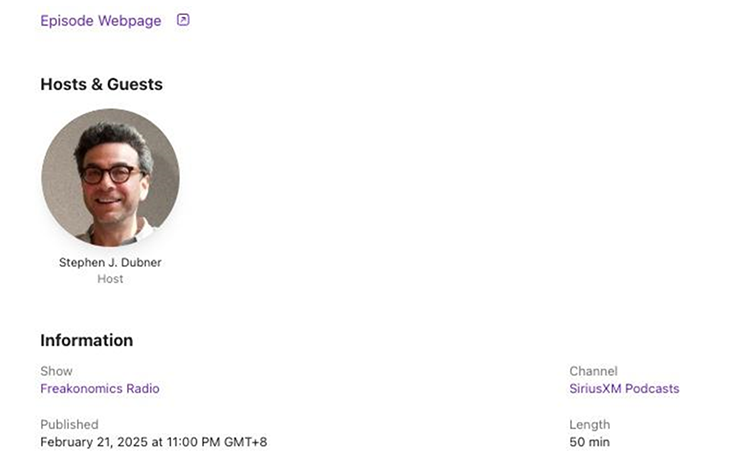
There, visitors find multiple ways to engage further — from joining their book club to exploring related podcast series like “No Stupid Questions” and “People I Mostly Admire.” They also offer additional resources and full transcripts for each episode, giving listeners compelling reasons to visit their site.
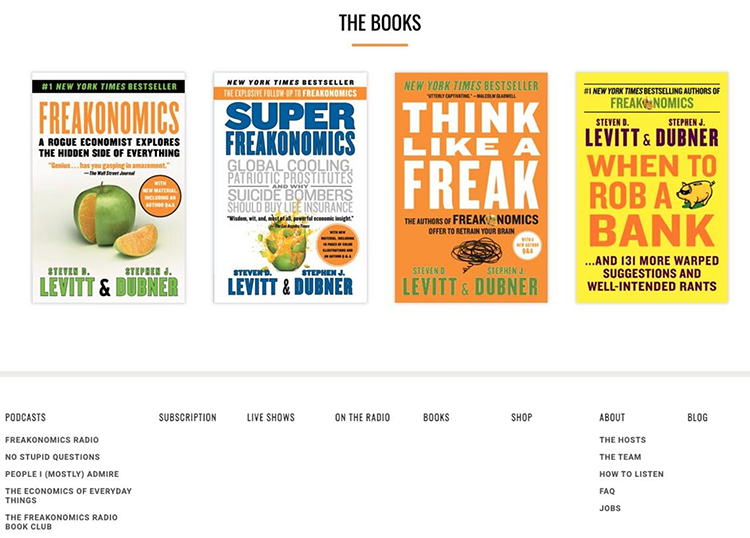
If you need to create landing pages and manage your email list all in one place without juggling multiple tools or getting bogged down by technicalities, ClickFunnels is worth checking out.
ClickFunnels makes it incredibly simple to create professional landing pages that convert podcast listeners into subscribers and customers.
With hundreds of pre-built templates optimized for different industries and goals, you can quickly build your website or launch pages that look great and perform well. The drag-and-drop builder lets you customize everything without touching code, while built-in email marketing tools help you nurture relationships with your audience through automated sequences.
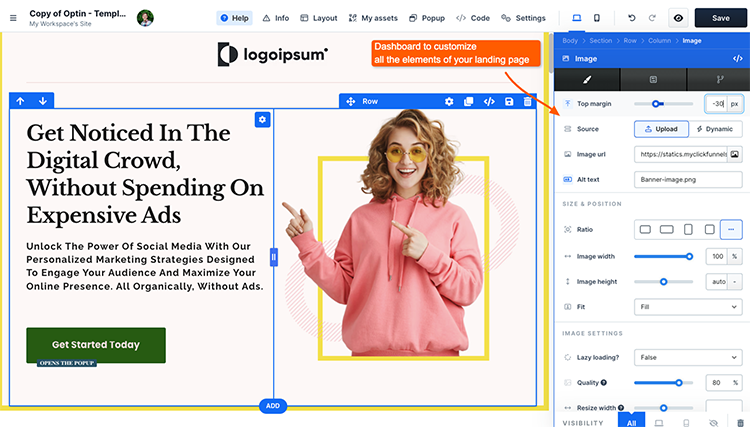
The platform’s email marketing tools help you stay connected with your audience, sending automated welcome messages and broadcasts.
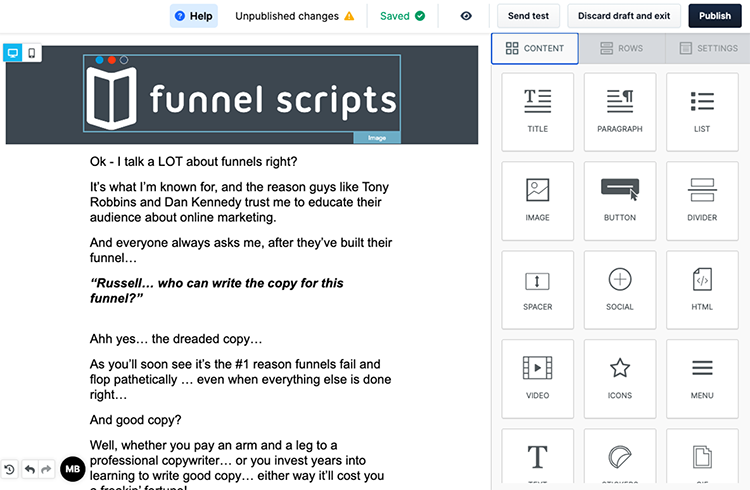
Try ClickFunnels for Free Today!
Encourage Your Guests to Promote Their Episode
When someone appears on your podcast, they become a natural ambassador for your show. But here’s what most hosts get wrong: they never ask guests to share the episode, or they make it too complicated to share. Your guests’ networks can dramatically expand your podcast’s reach – and they’re often happy to help if you make it easy.
Make it easy for guests to share by:
- Creating ready-to-use social snippets with key moments
- Providing them with custom episode artwork
- Including their social handles in show notes
- Sending them a simple email template to share with their audience
For example, when Harry Dry appeared on David Perell’s “How I Write” podcast, he shared it with his 43,000+ Twitter followers, bringing a flood of new listeners to David’s show.
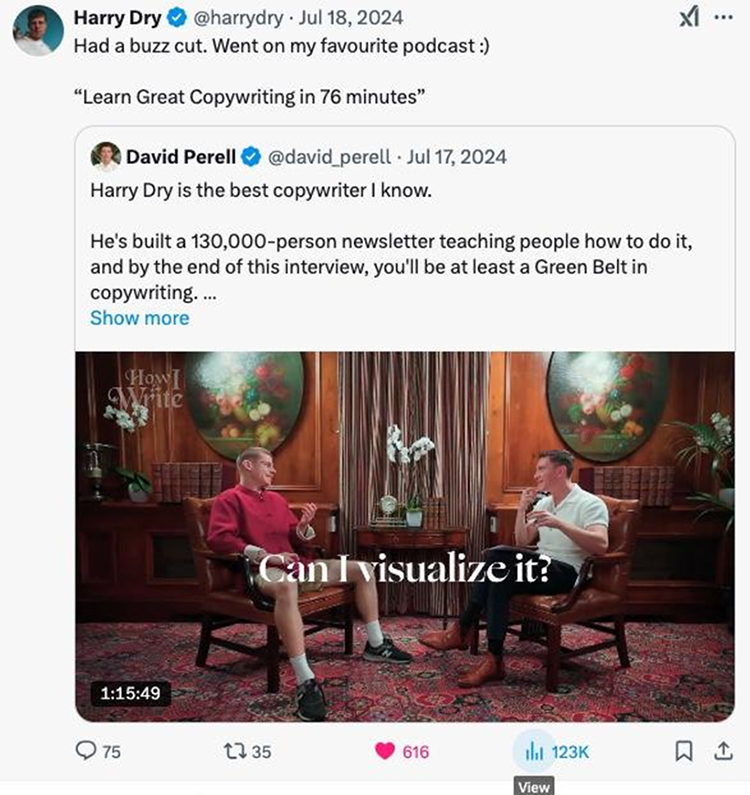
This kind of promotion feels natural because guests want to showcase their expertise and media appearances. When they share your episode, you’re not just getting listeners – you’re reaching a pre-qualified audience who already trusts your guest’s recommendations.
Final Thoughts
Most successful business podcasts aren’t necessarily the ones with the biggest budgets or the fanciest equipment. They’re the ones that consistently deliver genuine value and build trust with their audience.
The key is to start with purpose, remain consistent with your content, and always focus on how you can help your listeners solve real problems. Don’t get caught up in perfectionism – your first episodes won’t be perfect, and that’s okay. What matters is getting started and improving as you go.
Once you’re ready to turn your podcast listeners into customers, try ClickFunels. It’ll help you create a solid infrastructure to capture and nurture these relationships.
ClickFunnels makes this process seamless by providing everything you need – from professional landing pages to email automation – all in one platform. Instead of cobbling together different tools and getting lost in technical details, you can focus on what you do best: creating valuable content for your audience.
Try ClickFunnels for Free Today!
Thanks for reading How To Grow Your Business which appeared first on ClickFunnels.
